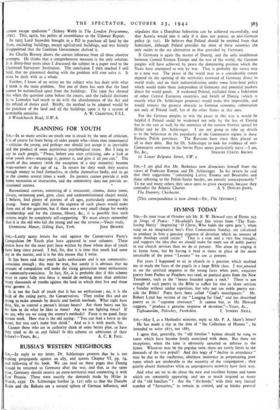RUSSIA'S WESTERN NEIGHBOURS
Su ,—In reply to my letter, Dr. Schlesinger protests that he is not making propaganda against an ally, and quotes Chapter VI, pp. 74, and following of his book. We can read on these pages that Danzig should be returned to Germany after the war, and that, at the same time, Germany should receive an extra-territorial road connecting it with East Prussia. These were exactly the demands made by Hitler in March, 1939: Dr. Schlesinger further (p. 520 tells us that the Danube Basin and the Balkans are a natural sphere of German influence, and
stipulates that a Danubian federation can be achieved successfully, and that Austria would join it only if it does not pursue an anti-German policy (p. 151). He believes that Poland should be omitted from that federation, although Poland provides for most of these countries the only outlet to the sea alternative to that provided by Germany.
If Germany is again the master of Danzig, and the only middleman between Central Eastern Europe and the rest of the world, the German peoples will have achieved by peace the dominating position which the Nazis have attempted to win by war. That is probably the surest way to a new war. The peace of the world may to a considerable extent depend on the opening of the territories eastward of Germany direct to world trade, and on their industrialisation under some lease-lend policy which would make them independent of Germany and potential markets direct for world goods. A weakened Poland, excluded from a federation of other Central European countries, and bereft of Danzig (which is exactly what Dr. Schlesinger proposes) would make this impossible, and would remove the greatest obstacle to German economic colonisation not only of Poland itself, but of the other States in this area.
For the German peoples to win the peace in this way it would be helpful if Poland could be weakened not only by the loss of Danzig but in the east as well, by the retention of the eastern frontier agreed by Hitler and by Dr. Schlesinger. I am not going to rake up details as to the behaviour or the popularity of the Communist regime in these Eastern Polish provinces. The Russians have since then placed us all in their debt. But for Dr. Schlesinger to look for evidence of anti- Communist sentiment in the Soviet Press seems particularly naive.—I am, Sir, &c., SPENCER CURTIS BROWN. 22 Lower Belgrave Street, S.W. i.


























 Previous page
Previous page